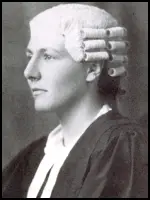Jane Archer

Jane Archer was born Kathleen Jane Sissmore in 1898. She was educated at Princess Helen's College in Ealing. She became head girl and her headmistress described her as "a strong character, very straight, well principled, industrious".
In 1916 she was recruited as a clerk at MI5. In her spare time she trained as a barrister. She gained first class examination results and was called to the Bar in 1924. She rose rapidly through the ranks and was eventually appointed as MI5's first woman officer. In 1929 she became for overseeing Soviet and Communist operations in the United Kingdom. In 1937 she employed Roger Hollis as her assistant.
Jane Sissmore married Wing Commander John Archer on 2nd September, 1939. Walter Krivitsky, a former NKVD agent, escaped to the United States. In January 1940 he was brought to London and interviewed by Jane Archer. Krivitsky told her that the idea was "to grow up agents from the inside". Krivitsky added: "This method had a great disadvantage in that results might not be obtained for a number of years, but it was regularly used by Soviet Intelligence Services abroad. Krivitsky mentioned that the Fourth Department was prepared in some instances to wait for ten or fifteen years for results and in some cases paid the expenses of a university education for promising young men in the hope that they might eventually obtain diplomatic posts or other key positions in the service of the country of which they were nationals."
Krivitsky told Archer about the Soviet spy who was a "a Scotsman of good family, educated at Eton and Oxford, and an idealist who worked for the Russians without payment" from a "very good family". He added that he believed Theodore Maly and Arnold Deutsch ran the source. However, both men had returned to the Soviet Union. Krivitsky claimed that the agent who worked in the Foreign Office was "ideological". Verne W. Newton, the author of Cambridge Spies: Untold Story of Maclean, Philby and Burgess in America (1991), has argued that only six to eight university graduates passed the Foreign Office entrance exam each year and that it should have been possible for MI5 to discover the name of the agent, Donald Maclean.
Krivitsky also pointed out that Theodore Maly also ran a young English aristocrat, who was a journalist who had working for a British newspaper during the Spanish Civil War. This man was a friend of the agent in the Foreign Office. Maly apparently sent this agent to Spain with the orders to assassinate General Francisco Franco. Some experts such as Gary Kern have argued that the information given by Krivitsky should have led to the arrest of Maclean's friend, Kim Philby.
Christopher Andrew, the author of The Defence of the Realm: The Authorized History of MI5 (2009) has defended Archer's reputation. "Her interrogation of the Russian defector Walter Krivitsky, early in 1940, was a model of its kind the first really professional debriefing of a Soviet intelligence officer on either side of the Atlantic. In November 1940, however, she was sacked after denouncing the incompetence of Kell's successor as director, Jasper Harker."
Although Guy Liddell believed that Archer "had unfortunately gone too far" Oswald Harker was to blame because "but for his incompetence, the situation would never have arisen, and he had, moreover, over a period of many years, encouraged frank criticism from Jane Archer."
Wing Commander John Archer was killed on 27th September, 1943.
Primary Sources
(1) Christopher Andrew, The Defence of the Realm: The Authorized History of MI5 (2009)
There was no wartime expansion, however, in the number of female MI5 officers. At the outbreak of war, the Security Service had only one such officer: Jane Archer (nee Sissmore), its main Soviet expert, who married the Service's RAF liason officer, Wing Commander John "Joe" Archer, during the lunch-hour on the day before war was declared. Her interrogation of the Russian defector Walter Krivitsky, early in 1940, was a model of its kind the first really professional debriefing of a Soviet intelligence officer on either side of the Atlantic. In November 1940, however, she was sacked after denouncing the incompetence of Kell's successor as director, Jasper Harker.
